PHOTO
Solidaridad and IDH, a Netherlands-funded programme have launched phase two of the National Initiative for Sustainable and Climate Smart Oil Palm Smallholders (NISCOPS) which targets to improve the production of oil palm while fostering a climate-friendly activity.
Speaking with journalists at the launch of the project on Tuesday in Abuja, the Ambassador of the Kingdom of the Netherlands to Nigeria, Wouter Plomp, said his country as part of its commitment to Nigeria is launching the second phase of NISCOPS to sustain a more environment-friendly and also a more social future of the palm oil production in Nigeria.
“You know very well that palm oil is vital for Nigeria’s economy, but so is the future of Nigeria’s precious forests and so is equitability in the division of the gains of the palm oil sector. So what we aim to achieve by this project is to have a more sustainable future and a more equitable future for palm oil production in Nigeria,” Plomp said.
Related PostsNo Content Available
The Head of Programs for Solidaridad in West Africa, Nathaniel Boateng who represented the Regional Director of Solidaridad, Isaac Gyamfi said the main focus of the launching is to ensure the improvement of oil palm within the region so that the region can feed itself, meet the demand of oil palm, it’s sustainable, and also that the farmers are able to cultivate in a way that does not harm the environment.
“There is the notion that oil palm contributes a lot to deforestation, so we seek to encourage farmers to invest more within the landscape that they are in to diversify and also enrich their production so that they get more from what they have instead of expanding into other landscapes or into the forest areas,” he added.
Boateng explained that the first phase was a test case to prove that indeed if farmers are to intensify, if they are to do best management practices, they can be able to produce more.
“It was a test case with a few farmers. In phase two, we are going to expand to other farmers, we are going to scale and consolidate the results that we have, but most importantly look for opportunities to also unlock climate finance for the farmers. So that is a new area that we want to venture into in the NISCOPS phase two.
“So, farmers are able to intensify, do best management practices to reduce emissions and mitigate carbon emissions so that they can unlock climate finance,” he added.
The CEO, Chairman Executive Board of IDH, Daan Wensing told journalists that they are working around the world globe to bring the power of the private sector to a sustainable development goal in terms of innovation power and the investment it can make. He said they are in partnership with Solidaridad, the government, public-private partnership, farmers and civil societies.
The Program Manager of Solidaridad, Kene Onukwube said the second phase of NISCOPS consolidates the achievement of the first phase. He said where there has been a huge reduction in carbon emissions, and they think it’s a proof of concept, they need to be able to scale that up and do more across the project locations.
“We have been able to up the yield for oil palm up to 115 tons per hectare and that’s a huge gap between where it was before, so we think that best management practices that are contributing to that should be further replicated across more locations, and that’s also what the second phase is bringing,” Onukwube noted.
He further explained that with the second phase they are going to be able to begin to build the bridge for local and international markets, so at the local space, the smallholder farmers and all the players will be there.
He said from the first phase of NISCOPS, they realized that very little is understood about issues around the sustainability standards that are the hallmark of the international market, so the second phase of the project will build the capacity of stakeholders, smallholder farmers on sustainability standards that will prepare them for the international markets.
“Very importantly, there is the key part on payment for ecosystem services, you can draw that down from issues around afforestation or reforestation, especially for degraded landscapes, so we want to be able to use this second phase to broaden that perspective, help farmers and communities to begin to take responsibility for the sustainability of their forests, for the forest landscapes vis-a-vis the oil palm landscape. The farmers we are going to work with now, we are looking at 12,000 and more,” he added.
Copyright © 2022 Nigerian Tribune Provided by SyndiGate Media Inc. (Syndigate.info).




















